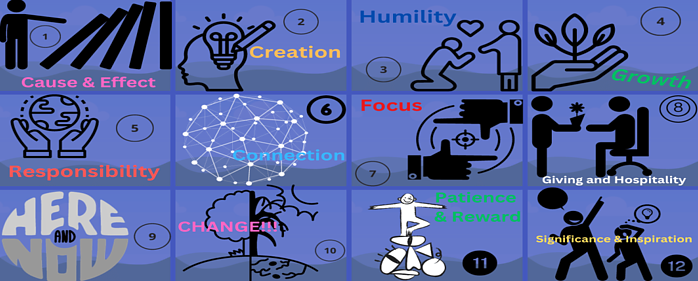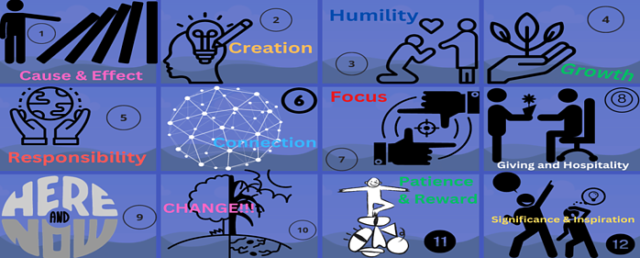
When I discuss the concept of karma in business, I’m referring to the idea that your enterprise’s fortunes are, in large part, the sum of all actions taken by you and those before you. It encapsulates the belief that nothing in business happens without a reason and ties directly to cause and effect. Every decision, every interaction, every deal you make is a seed planted, which will eventually bear fruit.
Recognizing this causality in your business dealings highlights the importance of each choice. Imagine that every step you take leaves an imprint, which can become part of a path to success or failure. The actions of our predecessors, those who paved the way before our business took shape, have also left a legacy that continues to influence our journey—this is the ancestral aspect of business karma.
The lens through which we view karma isn’t static; it’s as dynamic as the business world. The outcomes of our actions might not be immediately apparent. This delay often leads us to a space where we might feel our endeavours are not yielding results—a state termed ‘bad’ or ‘blocked’ karma. But patience is critical here, as effects can manifest over time.
Understanding karma also invites us to explore the rigorous laws that govern it. Ancient wisdom, such as the 12 Laws of Karma derived from Buddhism, sheds light on the intricate balances of cause and effect. While traditionally spiritual, these laws offer profound insights when applied to business practices and can guide us towards ethical and strategic growth.
Embarking on this philosophical journey into the realm of business karma lays the foundation for the next step: comprehending the temporal nature of consequences and how our present efforts will shape the future of our enterprises. As we transition to the next section, remember the adage ‘slow and steady wins the race’ as a reminder of the patience required to mature good business karma.
The Temporal Nature of Consequences: Bad, Blocked, and Good Karma
In business, not every action yields immediate rewards or consequences. That’s the tricky thing about karma: it’s not always linear, and the effects of your deeds, good or bad, can be deferred. This brings us to the discussion of bad, blocked, and good karma, which are pivotal in shaping the trajectory of any enterprise.
Bad karma in the business realm can surface from unethical practices, poor customer relations, or neglecting employee well-being. The repercussions might not be apparent instantly but can gradually erode trust and reputation, leading to long-term setbacks.
Blocked karma, on the other hand, occurs when positive actions fail to produce results swiftly. It’s akin to planting seeds that don’t sprout right away. Patience is crucial during this phase. Despite the frustrating wait, the fruits of your labour are incubating.
Good karma is the payoff for consistent ethical behaviour and smart, strategic decisions. It can manifest as customer loyalty, a strong brand, and expansion opportunities. To cultivate good karma, focus on transparent dealings, quality offerings, and stakeholder compassion.
One must understand that time is a dimensional canvas in the business world to navigate these karmic waters. Actions taken today might resonate in the echoing halls of tomorrow’s success or failure. Such is the temporal nature of karma—where patience isn’t just a virtue, it’s a strategic imperative.
Setting the Compass: Strategic Planning and Patient Execution
Imagine setting out on a journey without a destination. You’d likely encounter many detours and potentially end up nowhere or, at best, somewhere you never intended to be. The same analogy applies to business. Setting a clear destination or goal is the foundation of what I call ‘business karma.’
Careful goal setting isn’t just about having targets. It’s about aligning your actions with your values and your intended impact. It’s easy to get caught up in rapid execution or the pursuit of instant gratification, but I’ve learned that such impatience often backfires. It can disrupt the flow of good karma and delay success.
To avoid these detours, patience is critical. It helps you avoid hasty mistakes and invest your energy wisely. While it might feel counterintuitive, sometimes, the best way to move forward is to take a step back. This means thoughtfully considering your strategies and actions and reflecting on their potential long-term effects.
Equipped with a strategic plan and patient execution, you’re not just moving with speed; you’re moving with direction. You’re progressing towards a carefully chosen point on the map, influenced by your and your ancestors’ past actions. Remember, your present decisions are the seeds for your business’s growth.
The Big Picture: Defining Impact and Investing in Values
The question of impact is central to any discussion about business karma. It’s about having clarity on whether you’re in business to improve your own life, the lives of others, or both. Recognizing the type of change you aim to bring is the first step in ensuring your actions align with your business aspirations.
Investing in a set of values is like laying the foundation for a building; it determines the strength and the direction of the following structure. These values become the filter through which every decision and action are taken, influencing the course of your business’s karma.
For anyone running a business, particularly entrepreneurs, there’s a vital distinction to be made between focusing on visionary goals and getting caught up in the minutiae of day-to-day operations. One’s ability to zoom out and stay connected to the overarching objective often determines the level of success achieved.
Where the building blocks of daily operations meet the bigger picture is where the hard work manifests. This is about putting into place the technical side – building efficient systems, structures, and processes that will underpin the grand vision of your enterprise.
If you’re going it alone, you must cover every aspect, from the conceptual to the operational. Your success will hinge on your ability to step back periodically and view your enterprise objectively to ensure that every piece of the puzzle works towards the same goal.
The Practical Aspects of Good Business Karma: Systems and Processes
Think of your business as a complex machine. Like any well-oiled apparatus, it relies on efficient systems and solid structures to run smoothly. This can be seen as the technical side of good business karma
Operational excellence isn’t just about hard work visibly; it’s about creating repeatable processes that ensure consistency and quality in everything your company does. This approach is beautiful because it not only helps your business in the present but also sets a foundation for positive outcomes in the future.
If you’re going solo in business, you wear all the hats. You’re the strategist, the executor, and the visionary. And while this might seem daunting, it’s essential to approach each of these roles with a clear head and an organized method. It’s about understanding when to zoom in on the details and when to step back to view the larger picture.
Prioritizing becomes a pivotal practice. You might be tempted to plunge into many tasks, believing motion equals progression. However, it is crucial to differentiate between what is urgent and what is important. Your effort should go to tasks that align with your long-term objectives, carving out a pathway to substantial and meaningful achievements.
Embracing objectivity is vital; seeing your business from an external perspective allows you to make adjustments that can lead to improvements. It’s about consistently re-evaluating and refining your processes, being honest with yourself about what’s working and what isn’t, and making the necessary changes to enhance your business karma.
As you reinforce these systems, remember that what you invest in your business today dictates the success you’ll reap tomorrow. Your business’s karma is shaped by your dedication to fine-tuning these operational gears. With a sturdy structure in place, it’s time to reflect on how your business engagements and energy ripple outwards, as addressed in the next section.
Karma as a Business Boomerang: What You Send Out Comes Back
I appreciate the time-honoured truth that in business, like in life, what we put into the world tends to get back to us. This concept, often likened to the flight of a boomerang, holds a mirror up to our actions and intentions.
The effort you invest in your business today shapes your future landscape. It’s critical to recognize that cutting corners or prioritizing the wrong initiatives can lead to an unwelcome return when you least expect it.
I encourage you to reflect on the gravity of your daily business decisions and interactions. Understand that each choice is a seed planted, which will eventually grow and return to you in some form.
The essence of karma dwells not just in the actions themselves but also in the intent behind them. Ground your actions in ethics and positivity, aiming to serve rather than to gain. Doing so builds a foundation for business karma that rewards rather than penalizes.
In drawing from the ancient wisdom of the 12 laws of karma (see the leading diagram), let your business serve as a conduit for change, growth, and connectedness. Strive for personal success and the betterment of your community and world.
As we conclude, remember that your business is a living, breathing entity within a vast ecosystem of cause and effect. Nurturing it with careful effort, ethical practices, and positive intent positions it to thrive. In turn, it will provide value and inspiration, not only to you but to everyone it touches.



Hi Linden,
Your article “Business Karma: The Sum of Your Actions” provides a unique and insightful look into the concept of karma in a business context. I appreciate how you’ve woven the principles of ethical behavior and long-term strategic thinking into the fabric of business success. The idea that the actions and intentions of a business owner ripple outward and return, much like a boomerang, is a powerful reminder of the impact of our decisions. However, I’m curious about practical examples of how these principles have been successfully applied in real businesses. Could you share some case studies or real-life stories where good business karma has played a pivotal role?
Thank you for your work and sharing such thought-provoking insights!
Warm regards,
Makhsud
Hello again Makshud,
I’m glad you’ve returned because your comments truly inspire me.
No, it’s not just theory. I can cite many examples, but one in particular. Michael Cheney is my mentor. He is a multi-millionaire and is in the process of coaching and formulating his legacy as he no longer needs to make money. His balanced lifestyle is inspiring, almost abstinent and flawless.
He’s a family man with two small children, so he’s designed his entire life to be with his family while nurturing budding entrepreneurs as his hobby. He has truly given up sacrificing and knows exactly who he is and what he wants. A great example of ‘Wealth is the product of Man’s capacity to think.”
Not what you would expect at all. His business karma was very bad for many years, but he never gave up; he just let the failures go in an enlightened way. However, his determination and single-mindedness won in the end. You can read more about his philosophy if you would like here at my affiliate link, if you care to help me on my way. If not, you can google him as he’s so famous now.
Btw, I will be interviewing him in late January for MillionaireMIndsetRoadmap.com, which may be of interest. I’m in the middle of creating many case studies to demonstrate my points so hopefully you will be able to read more soon.
Thank you so much Makshud.
This post explores the profound concept of karma in the realm of business. The analogy of every business action being a seed planted, eventually bearing fruit, resonates deeply. The discussion on bad, blocked, and good karma adds a practical dimension, emphasizing the importance of ethical behavior, patience, and strategic decision-making. The temporal nature of consequences is a crucial reminder to view the business journey as a dynamic process with delayed outcomes, reinforcing the significance of long-term thinking.
I appreciate the emphasis on strategic planning and patient execution, drawing parallels between a business journey without clear goals and a directionless physical journey. The practical aspects of good business karma, focusing on systems and processes, provide actionable insights for entrepreneurs, stressing the importance of operational excellence and prioritization.
As I engage with this thought-provoking piece, I’m curious to know how you personally integrates the concept of karma into their daily business decisions and practices. Also, given the mention of the 12 Laws of Karma from Buddhism, I’m interested in understanding which specific law resonates the most with you in the context of business, and how it has influenced you?
David
Hi again David,
That’s another great comment! I am so glad to have touched you with my post. I like your analogies with the business world, so I would like to quote you, if I may.
Karma is with me always. It informs and protects every word I say and every action I perform – because we can’t take them back. It ensures that I am ethical and transparent in my business practices.
The Law of Cause and Effect–whatever we say or do creates a ripple somewhere in the world. Also, the Law of Attraction is key. These two laws are sufficient to enable me to live happily and compassionately. It’s simple. But we need skills like mindfulness leading to meditation to subdue the busy mind and return to our true nature before they become conscious and ever-present.
All the best of success and blessings. 🙏🏼😊
Cet article explore le concept profond du karma dans le domaine des affaires. L’analogie selon laquelle chaque action commerciale est une graine plantée, qui finit par porter ses fruits, résonne profondément. La discussion sur le mauvais, le bloqué et le bon karma ajoute une dimension pratique, soulignant l’importance du comportement éthique, de la patience et de la prise de décision stratégique. La nature temporelle des conséquences nous rappelle de manière cruciale qu’il faut considérer le parcours professionnel comme un processus dynamique aux résultats différés, renforçant ainsi l’importance d’une réflexion à long terme.
J’apprécie l’accent mis sur la planification stratégique et l’exécution patiente, établissant des parallèles entre un parcours professionnel sans objectifs clairs et un parcours physique sans direction. Les aspects pratiques d’un bon karma commercial, axés sur les systèmes et les processus, fournissent des informations exploitables aux entrepreneurs, soulignant l’importance de l’excellence opérationnelle et de la priorisation. Alors que je m’engage dans cet article qui suscite la réflexion, je suis curieux de savoir comment vous intégrez personnellement le concept de karma dans vos décisions et pratiques commerciales quotidiennes. De plus, étant donné la mention des 12 lois du karma du bouddhisme, je souhaite comprendre quelle loi spécifique vous concerne le plus dans le contexte des affaires, et comment elle vous a influencé ?
Ismail.
Merci pour votre perspicace commentaire. Je suis ravi de que mon article vous a profondément touché.
Votre questions:
1. Je suis conscient du karma à chaque instant. Cela m’aide à agir de manière éthique et compatissante dans le monde des affaires. De ce fait, j’évite non seulement de crèer un mauvais karma pour moi-mème, mais pour le marchè internet en gènèral. Ce dernier est ma mission sacrée.
2.La plus importante des 12 lois de l’univers pour les affaires sont la loi de l’attraction et de cause à effet. L’attraction est notre lien créatif et positif avec le miroir de l’Univers qui reflète les bonnes choses en retour. La cause et l’effet est la loi du karma. Tous ce que nour pensons our faisons a un effet quelque part, parfois sur quelqu’un.
La vôtre dans l’amour de la gentillesse.
Bénédictions et succès
Linden
Hi Linden,
Your article on Business Karma beautifully combines spiritual principles with business ethics, reminding us that our actions and intentions ripple through our enterprises. It’s an enlightening view that emphasizes the importance of mindful decision-making and ethical practices. How have you personally witnessed the impact of good or bad business karma in your career, and what advice would you give to someone starting their entrepreneurial journey with these principles in mind?
Thank you for sharing such profound insights and weaving them into the business strategy.
Warm regards,
Makhsud
Hi there, Dear Makhsud,
Thank you, as always. I’m so pleased I could successfully couple karma with business in your eyes.
Karma is my daily companion. I’m nearly always aware of it nowadays, which purifies my mindset and behaviour. As you say, this awareness makes me mindful and ethical.
For someone starting out, I recommend that they establish a daily practice of gratitude and mindfulness and focus on their inner happiness because this is where success starts. Before you can be publicly acclaimed, you need to succeed inside and enjoy what you are doing. Starting an internet business is a golden opportunity to connect deeply with your true nature. If you don’t know who you are, then how can you be truly productive and succeed? This is how I live your ideal life, according to my philosophy.
Blessings, Success and warm regards to you, too.
Linden
This blog post resonates deeply with me as it addresses a fundamental truth often overlooked in business – the concept of “business karma.” It’s refreshing to see someone acknowledge the interconnectedness of actions and outcomes in the business world.
In today’s hyper-competitive environment, it’s easy to get caught up in the pursuit of profit at all costs, often neglecting the impact our decisions have on others and the broader community. However, this short-sighted approach fails to recognize the long-term implications of our actions.
As the post rightly points out, fostering a culture of integrity, empathy, and ethical conduct not only benefits society but also contributes to long-term success and sustainability for businesses. In an era where corporate scandals and unethical behavior seem all too common, prioritizing ethical business practices is not just a moral imperative but also a strategic advantage.
Ultimately, the idea of “business karma” serves as a powerful reminder that the choices we make today shape the future of our organizations and the world at large. By prioritizing integrity and compassion in our business dealings, we not only enhance our own reputations but also contribute to a more just and equitable society.
Thank you, Chris, for this thorough response. I am reassured that my spiritual approach to business resonates with you.
Yes, I am most concerned about the future of Internet business. If as many people as possible are made aware that their actions and thoughts ripple through the community and customers, they may reflect more deeply before taking action. The Internet is the future for all of us, especially in the face of war, natural disasters, and pandemics.
Blessings and Success.